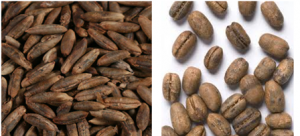IIT Guwahati Developed Biofuel from Non-edible Waste Seeds
IIT Guwahati researchers have developed methods to produce biofuels from non-edible seeds.
There have been worldwide attempts to produce fuel from renewable biological resources in order to overcome future oil shortages in the world. But conversion of food resources to fuel affects the global supply-demand of food, especially in developing countries. To tackle this problem, Indian Institute of Technology (IIT) Guwahati researchers have developed methods to produce biofuels from non-edible seeds.
“Oils derived from non-edible seeds of plants can be used to produce biofuels, to eliminate the competition between food and fuel”, said Dr Kaustubha Mohanty, Professor, Department of Chemical Engineering, IIT Guwahati. Plants and trees found in India, such as peelakaner, mahua, gulmohar, neem, rain tree, castor, kusum etc., produce seeds that have oil from which biofuels can be made. Dr Mohanty and his research team use a heat-chemical route to produce biofuels from these and other such seeds that they painstakingly collect from various parts of the country. “We found that these non-edible seeds had a high amount of oil in them, which was exciting”, said Dr Mohanty.
The researchers designed a low-cost pyrolyzer to obtain biofuel from these oils. While the yield of biofuel was very encouraging, there were some problems – the biofuel had lower acidity and high oxygen content, which made them unsuitable for use as transportation fuel.
To improve the properties of the biofuels derived from non-edible seed oils, the scientists used various catalysts such as calcium oxide, zeolite, etc., during the conversion of seed oil to biofuel. Both yield and quality improved; the biofuels produced were comparable in properties to regular diesel, except for viscosity.
“The higher viscosity of our biofuel is still a problem, but we’ll find a way to overcome this”, says Dr Mohanty.
Biofuel is not all they have obtained from these non-edible seeds. After purification of the oil derived from the seeds, the team was left with valuable chemicals in the discards, which find a plethora of industrial applications. One such remnant they could recover was hexadecanoic acid, which is used in making soaps, various cosmetic products, and release agents. Another was stearic acid that has numerous industrial applications. “This is truly a waste-to-value operation”, says Dr Mohanty. The team is seeking to understand the chemical mechanisms by which biofuels are produced from these sources and are studying their applicability in engines.
The team has also derived bio-oil from a mixture of waste plastics and waste biomass. Single-use nitrile gloves used in lab and medical settings were used for this purpose.
“The demand for biofuel is expected to increase in future and it is certainly not sustainable to generate them from food sources” said Dr Mohanty.
The results of this study have been published in the journal Bioresource Technology. The research team includes Dr Ranjeet Kumar Mishra, Dr Krushna P. Shadangi, Mithelesh Koul, Gautam Ganeshan and Gourav Chatterjee. (India Science Wire)
